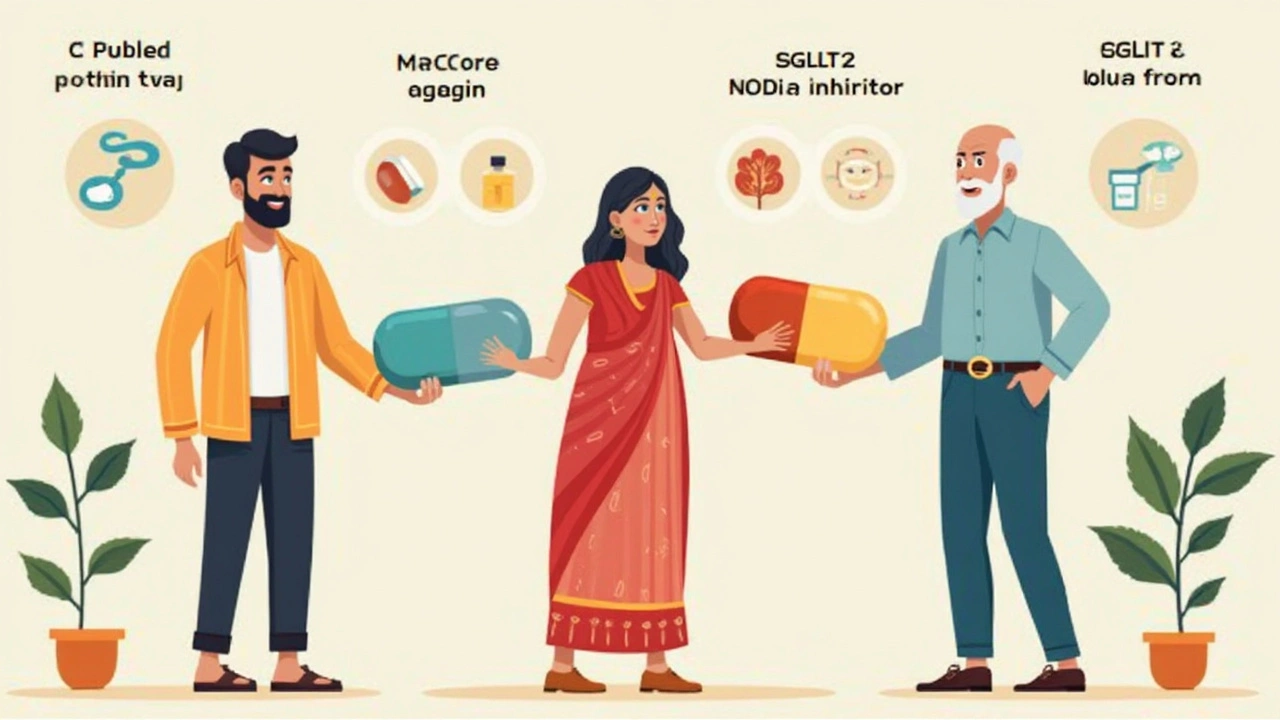Searching for the best medicine for diabetes feels a bit like asking, "What’s the best car?"—it honestly depends on who's asking and what they need. There’s no magic pill that works for everyone. Your age, weight, other health problems, and even how your body reacts to different meds all matter.
Most people starting out with type 2 diabetes will hear about metformin first. It’s tried and tested, usually easy on the wallet, and keeps your liver from pumping out too much sugar. But here’s the thing—what works for your neighbor might not work for you. Some folks start feeling stomach upset, while others just don’t see their blood sugar drop enough. That’s why there’s a whole menu of options now, including newer meds that also help with weight loss or heart protection.
Your doctor will probably mix and match until your blood sugar numbers settle in the right zone. Don’t be surprised if you end up switching medications a couple of times. And remember, medicine is only one piece of the puzzle. Food, activity, stress, and even how much you sleep can mess with your sugar levels more than you think.
- Why No Single 'Best' Diabetes Medicine Exists
- Metformin: The Old Favorite
- Newer Drugs Changing the Game
- Insulin: Still Essential for Some
- Tips for Making Your Medication Work Better
Why No Single 'Best' Diabetes Medicine Exists
When it comes to diabetes, one size never fits all. There’s not just one diabetes medicine that takes the crown because everyone’s body is different. Some people absorb meds fast, others super slow. Some have trouble with their kidneys, while others have heart issues or want to lose weight. Plus, type 1 and type 2 diabetes are almost like different beasts – their treatment plans can look nothing alike.
Experts stress that matching meds to people is about more than just lowering blood sugar. You have to look at the whole picture—side effects, affordability, other health problems, and even personal goals. As Dr. Robert Eckel from the American Diabetes Association puts it:
“The ‘best’ diabetes medication is the one that is safe, effective, affordable, and fits the lifestyle and health needs of the person taking it.”
Check out how much variety there is with just the main categories of diabetes drugs:
| Drug Type | How it Works | Common Side Effect | Extra Benefit |
|---|---|---|---|
| Metformin | Lowers liver sugar output | Stomach upset | May help with weight loss |
| SGLT2 Inhibitors | Help kidneys remove sugar | Yeast infections | Protect heart/kidneys |
| GLP-1 Agonists | Boost insulin, curb hunger | Nausea | Promotes weight loss |
| Insulin | Adds missing insulin | Low blood sugar risk | Needed for type 1 |
That’s just the short list—there are even more sub-types. On top of all this, your insurance and budget can swing your choices in a big way, sometimes even more than what your doctor recommends.
If you want your medication to do its job, it’s not just about “Which pill is best?” It’s about finding the one that works in real life, fits your vibe, and keeps you healthy long term. That’s why doctors switch things around so often—often, what works today might not work a year from now if life throws you a curveball.
Metformin: The Old Favorite
If you ask almost any doctor about a starting point for treating type 2 diabetes, metformin usually comes up first. It’s been around since the 1950s and has strong evidence behind it. The reason metformin sticks around? It works. This medicine helps your body use insulin better and keeps your liver from releasing too much sugar into your blood.
Metformin is often the first pick because it’s effective, pretty affordable, and most people handle it well. Studies show it can lower A1C (that’s your average blood sugar over three months) by about 1%—which is solid for one medicine alone. A cool bonus: people taking metformin don’t tend to gain weight, and some even drop a few pounds.
Here’s what you need to know if you start taking metformin:
- It’s usually taken once or twice a day, most often with meals to cut down on stomach drama.
- The most common side effect is upset stomach or diarrhea, but this often gets better after a few weeks or if you start on a low dose.
- Very rarely, it can mess with vitamin B12 levels. That’s why some doctors check your B12 once a year.
- Metformin is not for everyone—folks with serious kidney problems or certain other health issues might need a different drug.
Here’s a fact that surprises a lot of people: metformin doesn’t usually cause low blood sugar (hypoglycemia) on its own. So, you don’t have to worry as much about sudden sugar crashes.
It’s no wonder metformin is the best diabetes medication for millions around the world. But if you’re not reaching your blood sugar goals with just metformin, don’t stress. There are plenty of other meds your doctor can add or switch in.

Newer Drugs Changing the Game
If you’ve got diabetes and metformin’s not enough—or it messes with your stomach—you’re probably going to hear about some newer options. These aren’t just tweaks on old drugs; they actually work in totally new ways and come with extra perks.
GLP-1 agonists (like semaglutide—that's Ozempic and Wegovy) have exploded in popularity. They not only lower blood sugar but can help with weight loss, sometimes even more than 10% of your starting weight. Some studies show they cut your risk of heart attacks and strokes too. They’re usually weekly shots, but a pill form is starting to show up.
Then there are SGLT2 inhibitors (think Jardiance, Farxiga). These help your kidneys flush excess sugar into your pee. Besides lowering blood sugar, they've been shown to protect your heart and kidneys—even if you don’t have major heart or kidney issues yet. These are taken as daily pills. The side effects? There’s a higher chance of yeast infections, and you might pee more. But for many, the results are worth it.
- GLP-1 agonists: Lower A1c, easy on the heart, may help you drop weight.
- SGLT2 inhibitors: Lower sugar, protects kidneys, good for the ticker, can cause dehydration or genital infections if you’re not careful.
Here’s a glimpse at how these newer meds stack up compared to older ones:
| Medication Type | Main Benefit | Weight Impact | Heart/Kidney Protection |
|---|---|---|---|
| Metformin | Lowers blood sugar | Neutral | Some benefit |
| GLP-1 Agonist | Strong blood sugar drop | Weight loss | Yes |
| SGLT2 Inhibitor | Lowers blood sugar | Some weight loss | Yes, very strong |
Keen to try something new? Insurance and cost will matter a lot. These new meds can get pricey. Still, they’re rewriting the playbook for diabetes medicine—especially if you care about weight or heart health along with your blood sugar.
Insulin: Still Essential for Some
When pills just aren’t cutting it, insulin steps in. For a lot of people with type 1 diabetes, it’s non-negotiable—their bodies simply don’t make insulin at all. In type 2 diabetes, though, it usually enters the picture after other diabetes medicine options don’t get blood sugar under control, or at times when blood sugar spikes way out of range.
Why does insulin matter so much? Well, without it, sugar builds up in your blood instead of getting into your cells, which can really mess up your energy and even damage your organs over time. Some newer diabetes drugs help your body use its own insulin better, but sometimes there’s just not enough to go around, especially after years of living with diabetes.
"Insulin is still the most effective way to lower very high blood sugars and prevent dangerous complications—it’s not about ‘failing’ at other treatments, it’s about doing what’s necessary," says Dr. Samuel Klein, director at the Center for Human Nutrition in St. Louis.
There are a bunch of types you’ll hear about, mostly fitting into two groups: fast-acting and long-acting. Fast-acting insulin helps tackle mealtime blood sugar spikes. Long-acting insulin keeps things steady over 24 hours. Most folks using insulin for type 2 start with the long-acting kind once a day, then add in more if needed.
| Insulin Type | When It Works | Common Brand Names |
|---|---|---|
| Rapid-acting | 15 min to 3 hours | Humalog, Novolog |
| Short-acting | 30 min to 6 hours | Regular insulin |
| Intermediate-acting | 2 to 14 hours | NPH insulin |
| Long-acting | Up to 24 hours | Lantus, Levemir, Tresiba |
Insulin might seem intimidating if you’re not used to needles, but there are insulin pens and even tiny pumps that make things way less scary. The biggest tip: keep a close eye on your blood sugar, since insulin can sometimes push it too low if you’re not careful. Pair your insulin doses with regular meals, and check in with your doctor if your numbers keep bouncing around.
Short on cash? Ask your healthcare team about cheaper generic options or programs—cost shouldn’t keep you from staying healthy. With today’s tools and better support, starting insulin isn’t the mountain it used to be. For plenty of folks, it's simply the next step to getting your life (and numbers) back on track.

Tips for Making Your Medication Work Better
Meds do a lot of heavy lifting, but if you’re not helping them out, you’re only getting half the results. The goal isn’t to take more pills; it’s to get the most out of what you’re already using. Check out these real-world tips that make a difference.
- Take your diabetes medicine at the same time every day. Consistency helps keep your blood sugar steady. Set a phone alarm if you need to.
- Don’t skip meals or go too long without eating, especially if you’re on meds that can cause lows (like insulin or sulfonylureas). Skipping food can send your sugar crashing.
- Watch for anything new: if you throw up, get sick, or start a new vitamin or supplement, talk to your doctor. These things can mess with how your medicine works.
- If you’ve recently lost or gained a lot of weight, your dose might need a tweak. Lots of people need adjustments after losing just 10–15 pounds.
- Keep track of your blood sugar. Write it down or use a diabetes app. Spotting patterns helps your doctor (and you) figure out what’s working.
| Habit | Average HbA1c Reduction |
|---|---|
| Taking meds as prescribed | up to 1.5% |
| Daily 30-min walk | 0.5% – 1% |
| Eating regular meals | 0.3% – 0.6% |
| Tracking blood sugar | up to 0.7% |
One more big thing: If your diabetes medicine causes side effects, tell your doctor right away. Don’t just stop or adjust doses on your own. With so many options, you don’t have to settle for feeling lousy.
Last tip—if money gets tight, ask about generics or drug assistance programs. Many people don’t realize affordable options even exist until they ask.
